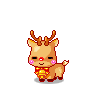Tooi Nemuri
These two stories gave me pause. They are interesting, but tough, and more realistic, than romantic, with bittersweet resolutions. (1) Chizumi's postpones dealing with his unresolved feelings for a dead friend by raising the friend's son, Ibuki, and having grief-relief sex with his other friend, Yatabe. When Ibuki confesses, Chizumi indulges his infatuation far too much for my personal comfort, but he does realize his mistake and takes action to correct it. Unfortunately, it throws his entire motive for rearing Ibuki into the realm of exploitation, rather than a sincere concern for his well-being, and he wounds Ibuki with, both, the inevitable rejection and the wildly disparate balance of power (Ibuki being completely dependent and vulnerable in their situation.) Realistically, people do betray ones who love them this way, without atoning or making amends, but it leaves a bitter aftertaste. Not quite as bitter as (2) the relationship between Kazuhi and Ichiyama, where atonement is expressed through violence. Yamakami Ryou's stories have an unsettling sense of personal contradiction, with pain and betrayal at the heart, but they are insightful and highly readable dramas, well worth the time and effort.




The end of youth ~Ai no, Uta~